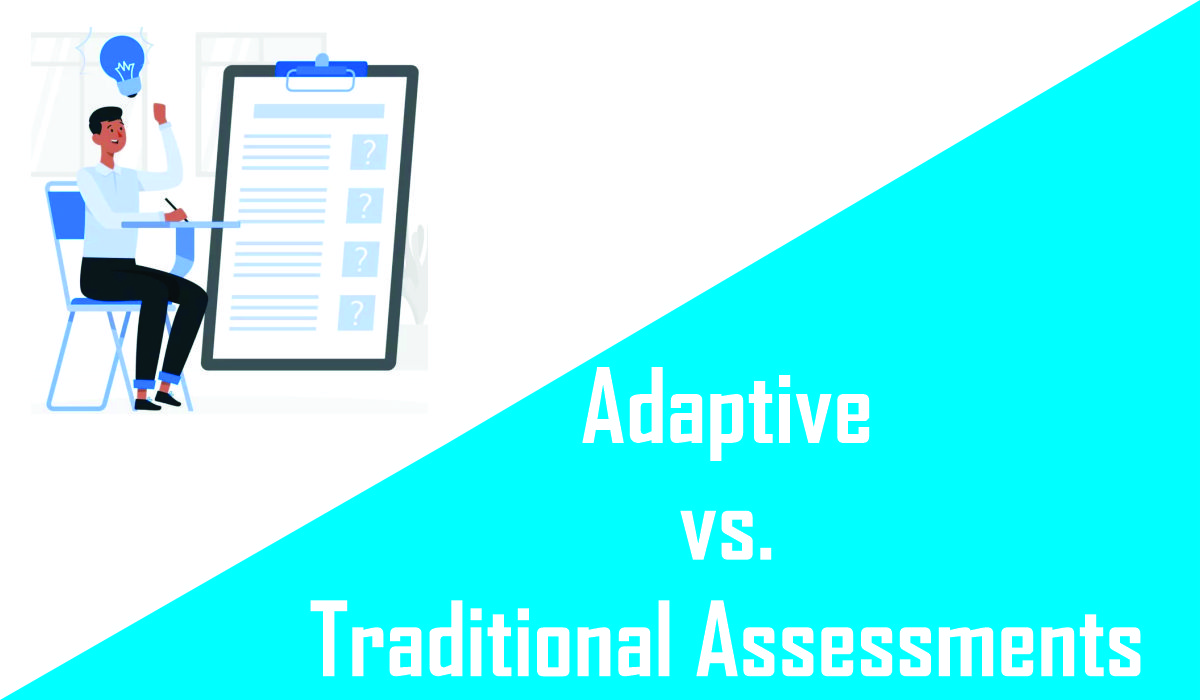Adaptive vs. Traditional Assessments: Which is Better for Students?
Which Assessment Method Is Right for Students?
Assessments are a big part of the school. They help teachers know what students understand. There are two main types of assessments: traditional and adaptive. Traditional assessments include tests like multiple-choice or written exams. Adaptive assessments change based on how well a student is doing.
Choosing the right type of assessment is important. It helps students learn better. Traditional tests are good because they are the same for everyone. This makes it easy to compare scores. But, they can be stressful and may not show what a student knows. Adaptive tests are different. They adjust to each student’s level. This can make them more accurate and less stressful.
Teachers need to think carefully about which type of test to use. The right assessment method can help students do their best. It can also help teachers understand what each student needs to learn.
What Are Traditional Assessments?
Traditional assessments are the old-fashioned way of testing in schools. They include tests like multiple-choice, essays, and standardized exams. These tests help teachers see how much students know. They are the same for everyone and do not change based on the student’s answers.
Definition and Characteristics
Traditional assessments are tests given to students to measure their knowledge. These tests are the same for every student. They have set questions and answers. Students usually take these tests on paper or a computer. Traditional assessments are good for comparing student performance because everyone gets the same test.
Common Types of Traditional Assessments
Traditional assessments are a common way for teachers to measure what students have learned. These tests have been used in schools for a long time. They include different types of assessments that students are familiar with. Let’s explore some of the most common types of traditional assessments that you might encounter in school.
Standardized Tests
Standardized tests are the same everywhere. All students answer the same questions. These tests help compare students from different schools or places. Examples include state exams and national tests. Teachers use these tests to see how well students are learning.
Essays and Written Exams
Essays and written exams let students explain their thoughts. They write about what they know in their own words. This helps teachers understand how well students can think and write. Essays can be short or long, and written exams can have many questions.
Multiple-choice Tests
Multiple-choice tests have questions with several answers to choose from. Only one answer is correct. These tests are quick to grade. Teachers use them to check if students know specific facts. Students fill in bubbles or click on the right answer.
Traditional assessments are important in schools. They help teachers know what students understand and compare their progress. They have been used for a long time and are familiar to everyone.
Read Also: Blended Learning Defined and The Benefits of Using it
What Are Adaptive Assessments?
Adaptive assessments are special tests that change based on how well you are doing. They start with easy questions and get harder or easier depending on your answers. This way, the test fits you better and shows what you know.
Definition and Characteristics
Adaptive assessments are tests that adjust to each student. They start with a simple question. If you get it right, the next question is harder. If you get it wrong, the next question is easier. This makes the test just right for you. These tests help teachers understand your strengths and areas where you need more help.
How Adaptive Assessments Work
Adaptive assessments are special tests that change based on how well you are doing. Unlike traditional tests where everyone gets the same questions, adaptive assessments adjust to match your abilities. This means if you answer a question correctly, the next question might be harder.
If you answer incorrectly, the next question could be easier. This way, the test adapts to your learning level, helping teachers understand what you know and what you need to learn more about. Let’s dive deeper into how these assessments function and why they are becoming more popular in education.
Computer Adaptive Testing (CAT)
Computer Adaptive Testing, or CAT, is a common type of adaptive assessment. You take the test on a computer. The computer picks each new question based on your previous answers. This means no two students take the same test. CAT can find out what you know quickly and accurately.
Examples of Adaptive Assessments in Use
Many schools use adaptive assessments to help students learn better. For example, MAP Growth tests are used in many schools. They help teachers see how much students have learned over the years.
Another example is the GRE, a test for students who want to go to graduate school. These tests help make sure you are learning and growing at your own pace.
Adaptive assessments are a great way to see what you know. They change to fit you and give a clear picture of your learning. They help teachers know how to help you best.
Comparing Adaptive and Traditional Assessments
Comparing adaptive and traditional assessments helps us see which one is better for students. Both types have good points and bad points. Traditional tests are the same for everyone, while adaptive tests change based on how well you are doing. Let’s look at how they compare in different ways.
Flexibility and Customization
Adaptive assessments are flexible. They change based on your answers. If you get a question right, the next one is harder. If you get it wrong, the next one is easier. This way, the test fits you better. Traditional assessments are not flexible. Everyone gets the same questions, no matter what.
Student Engagement and Motivation
Adaptive assessments can make you feel more engaged. The questions match your level, so you are less likely to get bored or frustrated. You might find it fun to see how well you can do. Traditional assessments can be boring. They might be too hard or too easy, which can make you lose interest.
Accuracy and Fairness
Adaptive assessments are very accurate. They quickly find out what you know and don’t know. This makes them fair because they test your real knowledge. Traditional assessments might not be as fair. If the test is too hard or too easy, it may not show what you truly know.
Feedback and Learning Outcomes
Adaptive assessments give quick feedback. You can see how well you are doing right away. This helps you learn faster because you know what you need to work on. Traditional assessments take longer to grade. You have to wait to find out how you did, which can slow down your learning.
Advantages of Traditional Assessments
Traditional assessments have many benefits for students and teachers. They include tests that everyone takes the same way. These tests are familiar and easy to use. Let’s look at why traditional assessments are helpful in schools.
Standardization and Benchmarking
Traditional assessments are standardized. This means everyone takes the same test in the same way. Because of this, it’s easy to compare scores. Teachers can see how students are doing compared to others. Schools can use these tests to measure progress over time. This helps in setting benchmarks and goals for learning.
Familiarity for Students and Educators
Traditional assessments are familiar to everyone. Students know what to expect because they have taken these tests before. Teachers know how to prepare students for these tests. This makes the testing process less stressful. Both students and teachers feel more comfortable with something they know well.
Ease of Administration
Traditional assessments are easy to give. Teachers can quickly hand out tests and collect them. Grading is straightforward, especially with multiple-choice questions. Schools don’t need special equipment or technology. This makes traditional assessments simple and efficient to use.
Advantages of Adaptive Assessments
Adaptive assessments have many benefits for students. These tests change based on how well you are doing. This makes them a great tool for learning. Let’s explore why adaptive assessments are so helpful in schools.
Personalization of Learning
Adaptive assessments personalize learning. The questions change to match your level. If you get a question right, the next one is harder. If you get it wrong, the next one is easier. This way, the test fits just right for you. It helps you learn at your own pace and shows what you know.
Immediate Feedback
With adaptive assessments, you get feedback right away. After you answer a question, you can see if you got it right or wrong. This helps you learn faster. You know what you need to work on and can improve quickly. Immediate feedback makes learning more effective.
Reduced Test Anxiety
Adaptive assessments can reduce test anxiety. The questions match your ability, so you are less likely to feel overwhelmed. You don’t get stuck on too many hard questions in a row. This makes the test less scary and more comfortable. When you feel relaxed, you can do your best.
Challenges and Limitations
Both traditional and adaptive assessments have challenges. It’s important to know these limits so we can use the tests wisely. Let’s look at the problems with each type of assessment.
Traditional Assessments
- Traditional assessments can be biased.
- Sometimes, the questions favor certain groups of students.
- This can be unfair.
- For example, a test might have questions that are easier for students who speak a certain language or come from a certain background.
- Teachers must be careful to make tests fair for everyone.
- Traditional assessments have a limited scope.
- They usually test only certain types of knowledge, like facts and formulas.
- They might not measure skills like creativity or problem-solving.
- This means they don’t show everything a student knows or can do.
- We need other ways to see a student’s full abilities.
Adaptive Assessments
- Adaptive assessments require technology.
- Students need access to computers or tablets.
- Schools without enough devices may face challenges.
- The software must work well and not crash during the test.
- Failure of the technology can prevent the completion of the assessment.
- Adaptive assessments collect extensive student data.
- This raises significant privacy concerns.
- Schools must ensure the protection of this information.
- It should not fall into unauthorized hands.
- Parents and students rely on schools to secure their data.
Conclusion
In deciding between adaptive and traditional assessments, it’s important to understand what each offers. Traditional assessments like tests with set questions are familiar and good for comparing students.
However, they may not show everything a student knows. Adaptive assessments adjust to a student’s level, which can make learning more personal and less stressful. They give quick feedback, showing where a student needs help and where they are doing well.
To choose the best assessment method, think about what works best for each student. Some students may prefer traditional tests because they are used to them. Others might like adaptive tests because they change with their answers. Teachers can use both types of tests to understand students better and help them learn.
Remember, the goal is to help students learn and grow. Whichever assessment method is chosen, it should be fair and helpful. Parents and teachers can work together to decide which type of test is best for each student. If you have any questions or want to share your thoughts, feel free to leave a comment below. Don’t forget to tell your friends about this information too!









